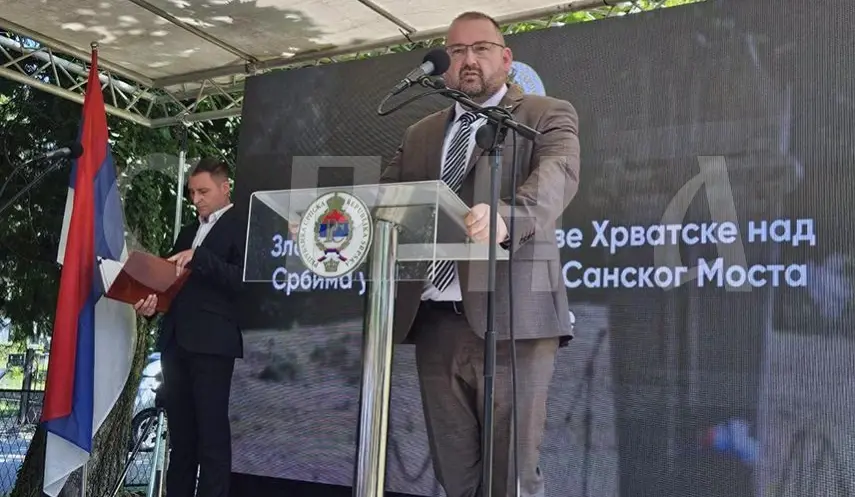NUŽDIĆ: BiH JUDICIARY PREFERS POLITICAL PERSECUTIONS TO PROSECUTING CRIMES AGAINST SERBS
FBiH - Šušnjar - Remembrance
08/02/2025
12:23

SANSKI MOST, AUGUST 2 /SRNA/ – Acting Director of the Republic Research Centre of War, War Crimes and Tracing Missing Persons, Viktor Nuždić, stated that judicial institutions at the level of BiH prioritize political persecutions over prosecuting crimes committed against Serbs.
Nuždić emphasized that the Hague Tribunal, which the internationals claimed would be a symbol of justice and fairness, did nothing in regard to crimes committed against Serbs during the 1991–1995 war.
“The same practice was adopted by the BiH judiciary. Only in 2018 was an indictment filed for crimes in the western Krajina municipalities against Atif Dudaković and 16 of his comrades from the Fifth Corps of the so-called Army of BiH; to this day, even the witness testimonies haven’t been completed,” Nuždić told the press at Šušnjar near Sanski Most.
He stressed that Šušnjar is one of the symbols of genocide committed against Serbs during World War II by the NDH /Independent State of Croatia/, alongside places such as Garevice, Stari Brod, Prebilovci, Pag, Jadovno, and the most infamous – Jasenovac, particularly its largest execution site Donja Gradina.
“These are the mass graves of the Serb people, victims of genocide during World War II. We must call things by their true name and always say that genocide was committed against Serbs. But what even the Ustaše didn’t manage to do during WWII is now happening in these regions today - Serbs are almost completely gone from the western Krajina municipalities, but it is interesting that history is repeating itself in terms of justice and fairness," Nuždić pointed out.
He pointed out that even after WWII, perpetrators of these crimes were not adequately punished; the same happened after the most recent war.
Nuždić believes that it is the duty of all institutions in Republika Srpska, Serbia, and of the Serb people to preserve the truth about the suffering and to honour the memory of the victims, so that such crimes never repeat.
He also noted that the current condition of the Šušnjar memorial site reflects the attitude toward Serb victims.
“It is clear that someone does not want the truth to be known and it seems that, as was systematically planned in the NDH, it would be ‘best’ if Serbs no longer existed in these areas,” Nuždić said.
He concluded by expressing concern that people are still not fully aware of the scale of atrocities that occurred during WWII, such as the murder of 5,500 people in Šušnjar, which places the municipality of Sanski Most among the most devastated areas during the war — and added that history repeated itself in the 1990s.

SERBS IN TEARS AND FEAR OVER OWNERSHIP OF ORTHODOX CEMETERIES AND CHURCHES

CVIJANOVIĆ DEMANDS ACCOUNTABILITY FOR SHAMEFUL CONCERT IN ŠIROKI BRIJEG

OSTOJIĆ URGES BiH AND EU TO ACT OVER GLORIFICATION OF FASCIST IDEOLOGIES





